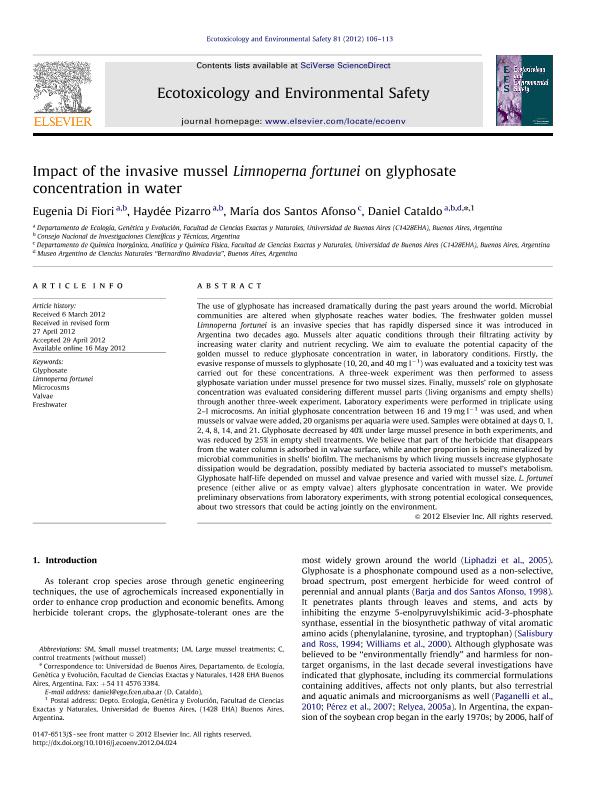Artículo
Impact of the invasive mussel Limnoperna fortunei on glyphosate concentration in water
Fecha de publicación:
07/2012
Editorial:
Academic Press Inc Elsevier Science
Revista:
Ecotoxicology and Environmental Safety
ISSN:
0147-6513
Idioma:
Inglés
Tipo de recurso:
Artículo publicado
Clasificación temática:
Resumen
The use of glyphosate has increased dramatically during the past years around the world. Microbial communities are altered when glyphosate reaches water bodies. The freshwater golden mussel Limnoperna fortunei is an invasive species that has rapidly dispersed since it was introduced in Argentina two decades ago. Mussels alter aquatic conditions through their filtrating activity by increasing water clarity and nutrient recycling. We aim to evaluate the potential capacity of the golden mussel to reduce glyphosate concentration in water, in laboratory conditions. Firstly, the evasive response of mussels to glyphosate (10, 20, and 40mgl-1) was evaluated and a toxicity test was carried out for these concentrations. A three-week experiment was then performed to assess glyphosate variation under mussel presence for two mussel sizes. Finally, mussels' role on glyphosate concentration was evaluated considering different mussel parts (living organisms and empty shells) through another three-week experiment. Laboratory experiments were performed in triplicate using 2-l microcosms. An initial glyphosate concentration between 16 and 19mgl-1 was used, and when mussels or valvae were added, 20 organisms per aquaria were used. Samples were obtained at days 0, 1, 2, 4, 8, 14, and 21. Glyphosate decreased by 40% under large mussel presence in both experiments, and was reduced by 25% in empty shell treatments. We believe that part of the herbicide that disappears from the water column is adsorbed in valvae surface, while another proportion is being mineralized by microbial communities in shells' biofilm. The mechanisms by which living mussels increase glyphosate dissipation would be degradation, possibly mediated by bacteria associated to mussel's metabolism. Glyphosate half-life depended on mussel and valvae presence and varied with mussel size. L. fortunei presence (either alive or as empty valvae) alters glyphosate concentration in water. We provide preliminary observations from laboratory experiments, with strong potential ecological consequences, about two stressors that could be acting jointly on the environment.
Palabras clave:
C
,
Freshwater
,
Glyphosate
,
Limnoperna Fortunei
,
Lm
,
Microcosms
,
Sm
,
Valvae
Archivos asociados
Licencia
Identificadores
Colecciones
Articulos(IEGEBA)
Articulos de INSTITUTO DE ECOLOGIA, GENETICA Y EVOLUCION DE BS. AS
Articulos de INSTITUTO DE ECOLOGIA, GENETICA Y EVOLUCION DE BS. AS
Citación
Di Fiori, Eugenia; Pizarro, Haydee Norma; Dos Santos Afonso, María; Cataldo, Daniel Hugo; Impact of the invasive mussel Limnoperna fortunei on glyphosate concentration in water; Academic Press Inc Elsevier Science; Ecotoxicology and Environmental Safety; 81; 7-2012; 106-113
Compartir
Altmétricas




